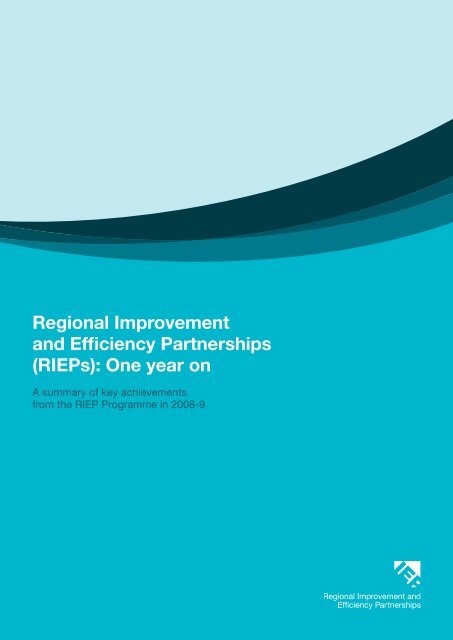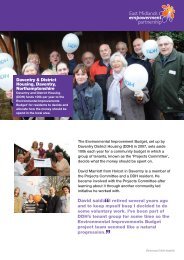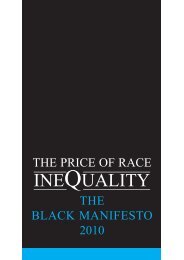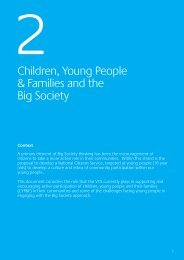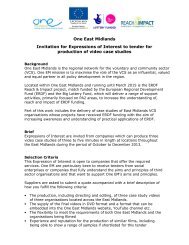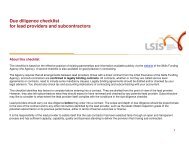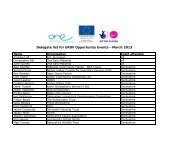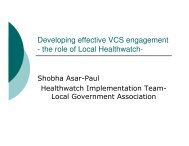Regional Improvement and Efficiency Partnerships - One East ...
Regional Improvement and Efficiency Partnerships - One East ...
Regional Improvement and Efficiency Partnerships - One East ...
You also want an ePaper? Increase the reach of your titles
YUMPU automatically turns print PDFs into web optimized ePapers that Google loves.
<strong>Regional</strong> <strong>Improvement</strong><br />
<strong>and</strong> <strong>Efficiency</strong> <strong>Partnerships</strong><br />
(RIEPs): <strong>One</strong> year on<br />
A summary of key achievements<br />
from the RIEP Programme in 2008-9
Contents<br />
Foreword from Councillor David Parsons CBE <strong>and</strong> Joyce Redfearn 3<br />
Executive Summary 4<br />
Key Progress <strong>and</strong> Achievements<br />
establishing councillor leadership <strong>and</strong> ownership by the<br />
local government sector 5<br />
supporting local authorities to accelerate efficiency gains 9<br />
supporting local authorities in the economic downturn 14<br />
supporting performance improvement 17<br />
supporting the delivery of ambitious Local Area Agreements (LAAs) 22<br />
empowerment 26<br />
innovation 28<br />
Looking forwards 31<br />
Appendix 1 32<br />
Appendix 2 33<br />
Endnotes 34<br />
page 2 <strong>Regional</strong> <strong>Improvement</strong> <strong>and</strong> <strong>Efficiency</strong> <strong>Partnerships</strong>: <strong>One</strong> year on
Foreword<br />
It is now one year since the<br />
nine <strong>Regional</strong> <strong>Improvement</strong><br />
<strong>and</strong> <strong>Efficiency</strong> <strong>Partnerships</strong><br />
(RIEPs) were established under<br />
the National <strong>Improvement</strong> <strong>and</strong><br />
<strong>Efficiency</strong> Strategy (NIES) <strong>and</strong><br />
we are delighted to introduce our<br />
first report on the RIEPs collective<br />
achievements to date. We hope<br />
you will find in this report, strong<br />
evidence of the depth <strong>and</strong> variety<br />
of their work with authorities to<br />
accelerate efficiency gains <strong>and</strong><br />
support improvement.<br />
The RIEPs are an important element<br />
of sector led improvement support<br />
<strong>and</strong> we are pleased that all RIEPs<br />
have established local leadership <strong>and</strong><br />
ownership of this agenda in their first<br />
year. It is particularly encouraging that<br />
the RIEPs have already repaid the<br />
initial investment made into the RIEP<br />
programme in year one, reporting gains<br />
of over £100m for 2008/9 with further<br />
ambitious efficiencies projected over the<br />
coming years. RIEPs have proven they<br />
can be agile <strong>and</strong> flexible by assisting<br />
the sector to respond effectively to<br />
the economic downturn <strong>and</strong> we have<br />
also made strides in supporting local<br />
authorities to deliver ambitious<br />
Local Area Agreements (LAAs), to<br />
collaborate on a wide range of innovative<br />
projects <strong>and</strong> on specific themed activity<br />
such as community empowerment.<br />
However we are not complacent <strong>and</strong><br />
we look forward to building on these<br />
successes in future years. Local<br />
authorities face challenges ahead with<br />
dem<strong>and</strong> rising for key services <strong>and</strong> the<br />
continuous pressure to make efficiencies.<br />
We recognise the need to sustain<br />
improvement in key services <strong>and</strong> to<br />
meet the new set of challenges<br />
introduced by Comprehensive Area<br />
Assessment (CAA). In this environment,<br />
the RIEPs will have a fundamental role<br />
in enabling local authorities to maximise<br />
their efficiency savings, facilitating<br />
collaboration, fostering innovation <strong>and</strong><br />
sharing good practice across the sector.<br />
We could not hope to detail in one<br />
document the variety of improvement <strong>and</strong><br />
efficiency projects which local authorities<br />
are working through their RIEPs to deliver<br />
on a daily basis, however we hope you<br />
will find in this report, a clear summary of<br />
the RIEPs’ key achievements in their first<br />
year of delivery.<br />
Cllr David Parsons CBE<br />
Chair of the Local Government<br />
Association (LGA) <strong>Improvement</strong><br />
Board <strong>and</strong> Leader of<br />
Leicestershire County Council<br />
Joyce Redfearn<br />
Chair of the Chief Executives’<br />
Task Group (CEXTG) <strong>and</strong> Chief<br />
Executive, Wigan Council<br />
<strong>Regional</strong> <strong>Improvement</strong> <strong>and</strong> <strong>Efficiency</strong> <strong>Partnerships</strong>: <strong>One</strong> year on page 3
Executive summary<br />
This report reflects the key<br />
achievements of the nine<br />
<strong>Regional</strong> <strong>Improvement</strong> <strong>and</strong><br />
<strong>Efficiency</strong> <strong>Partnerships</strong> (RIEPs)<br />
over their first year of delivery.<br />
It includes a number of case<br />
studies to illustrate individual<br />
RIEP’s work at regional levels <strong>and</strong><br />
their collective achievements as<br />
a programme. It also describes<br />
the challenges the RIEPs will be<br />
tackling in years two <strong>and</strong> three<br />
<strong>and</strong> what they plan to achieve.<br />
As such, this report celebrates both<br />
the variety of programmes which the<br />
RIEPs have developed with their local<br />
authorities at a regional level, <strong>and</strong> their<br />
collective achievements which include<br />
considerable combined efficiency<br />
savings, collaboration between regions<br />
<strong>and</strong> with national sector led bodies <strong>and</strong><br />
the development of robust improvement<br />
support for authorities <strong>and</strong> partnerships<br />
within a challenging economic context.<br />
Key messages arising<br />
from the 9 annual reports:<br />
• RIEPs are led <strong>and</strong> owned by Councillors<br />
<strong>and</strong> local authorities<br />
• RIEPs reported over £100m<br />
efficiency gains in their first year on<br />
an initial funding investment of just<br />
under £50m<br />
• RIEPs communicate with all English local<br />
authorities <strong>and</strong> have engaged with over<br />
95% of local authorities in their first year 1<br />
• RIEPs are supporting authorities to<br />
respond to the economic downturn <strong>and</strong><br />
deliver savings to operate within the next<br />
financial settlement<br />
Policy background:<br />
what are the RIEPs?<br />
The joint Communities <strong>and</strong> Local<br />
Government (CLG) <strong>and</strong> Local<br />
Government Association (LGA) National<br />
<strong>Improvement</strong> <strong>and</strong> <strong>Efficiency</strong> Strategy<br />
(NIES) published in December 2007<br />
announced the establishment of the<br />
RIEPs with a devolved funding package<br />
of up to £185m over the three year<br />
period, 2008-11. This funding is part of a<br />
total £380m devolved to the sector<br />
for improvement.<br />
RIEPs are partnerships of local authorities<br />
including fire <strong>and</strong> rescue authorities<br />
which work together at regional <strong>and</strong><br />
sub-regional levels to support improved<br />
efficiencies, performance improvement<br />
<strong>and</strong> more innovative approaches to<br />
service delivery.<br />
The NIES required the RIEPs to<br />
report back to government <strong>and</strong> local<br />
government on their progress through<br />
annual reports. The annual reports<br />
provide an opportunity for each RIEP to<br />
report back to local authorities in their<br />
regions, lead LGA members <strong>and</strong> CLG on<br />
the progress they have made in meeting<br />
the objectives set within their <strong>Regional</strong><br />
<strong>Improvement</strong> <strong>and</strong> <strong>Efficiency</strong> Strategies<br />
(RIES), on the programmes <strong>and</strong><br />
outcomes they have delivered to date,<br />
<strong>and</strong> on their focus for the year ahead.<br />
RIEPs meet regularly with collegues from<br />
the LGA <strong>and</strong> IDeA around a number of<br />
thematic topics such as empowerment<br />
<strong>and</strong> children’s services. An appendix<br />
detailing the name of each RIEP <strong>and</strong><br />
governance for the RIEP programme<br />
is available on p.33.<br />
• RIEPs have supported 36 authorities<br />
facing difficulties over the past year 2<br />
• RIEPs have facilitated innovative<br />
approaches so that authorities can take<br />
forward collaborative projects they may<br />
not otherwise have done<br />
page 4 <strong>Regional</strong> <strong>Improvement</strong> <strong>and</strong> <strong>Efficiency</strong> <strong>Partnerships</strong>: <strong>One</strong> year on
Key progress <strong>and</strong><br />
achievements in 2008-9<br />
The following provides an overview of<br />
the RIEPs’ key achievements to date.<br />
Considerably more detail about individual<br />
programmes <strong>and</strong> projects at regional<br />
level is available within each of the RIEP’s<br />
annual reports. Links to all the reports are<br />
available at www.idea.gov.uk/rieps<br />
1. Establishing Councillor<br />
leadership <strong>and</strong> ownership<br />
by the local government sector<br />
A key focus for all RIEPs in their first<br />
year of delivery has been to establish<br />
Councillor led governance at a regional<br />
level <strong>and</strong> to ensure ‘buy in’ <strong>and</strong><br />
ownership from local authorities.<br />
Highlights:<br />
• Robust Councillor <strong>and</strong> officer<br />
governance in place in all RIEPs<br />
• Sub-regional structures established<br />
in the North West, <strong>East</strong> Midl<strong>and</strong>s,<br />
South <strong>East</strong> <strong>and</strong> developing in<br />
Yorkshire <strong>and</strong> Humber<br />
• Councillor <strong>and</strong> officer champions<br />
identified to lead particular workstreams<br />
within all RIEPs<br />
A number of RIEPs have established<br />
Councillor <strong>and</strong> officer champions for<br />
their support programmes to promote<br />
the support they provide <strong>and</strong> ensure it<br />
remains responsive to local authorities’<br />
changing needs. This includes Chief<br />
Executive oversight of improvement<br />
packages in <strong>Improvement</strong> <strong>East</strong>, Capital<br />
Ambition’s engagement model <strong>and</strong><br />
thematic leads <strong>and</strong> sponsors for<br />
different programmes of activity<br />
within the other RIEPs.<br />
John Healey MP has been clear that<br />
demonstrating sector ownership of<br />
the RIEP programme is a key success<br />
criterion. All of the RIEPs are running<br />
communications programmes to keep<br />
authorities in the region informed of<br />
their work including regular newsletters,<br />
websites <strong>and</strong> annual conferences. This<br />
is complemented by national support<br />
for media <strong>and</strong> communications from the<br />
RIEP Programme Office.<br />
A number of RIEPs have conducted their<br />
own perception surveys of stakeholders<br />
at regional level which are reported within<br />
their annual reports <strong>and</strong> will be monitored<br />
over the next two years.<br />
• Development of integrated, sector led<br />
partnerships to deliver improvement<br />
support in key service areas. Examples<br />
include partnerships of fire authorities in<br />
the South <strong>East</strong> <strong>and</strong> the North West, the<br />
<strong>Regional</strong> Children’s Forum in the West<br />
Midl<strong>and</strong>s <strong>and</strong> integrated working with<br />
Joint <strong>Improvement</strong> <strong>Partnerships</strong> in adult<br />
social care in most regions including the<br />
South West, the <strong>East</strong> of Engl<strong>and</strong> <strong>and</strong> the<br />
<strong>East</strong> Midl<strong>and</strong>s<br />
<strong>Regional</strong> <strong>Improvement</strong> <strong>and</strong> <strong>Efficiency</strong> <strong>Partnerships</strong>: <strong>One</strong> year on page 5
Spotlight on Capital Ambition’s<br />
engagement model:<br />
Capital Ambition, the RIEP for London,<br />
is delivering a rolling programme of<br />
engagement meetings with all London<br />
authorities within its performance<br />
programme, ‘Raising the Bar’. Led by<br />
Capital Ambition Programme Board<br />
members, the meetings offer peer to peer<br />
challenge <strong>and</strong> support to each London<br />
Chief Executive. The meetings provide an<br />
opportunity to enhance relationships with<br />
key stakeholders, gather soft intelligence,<br />
compare <strong>and</strong> discuss local area<br />
performance <strong>and</strong> needs-based future<br />
challenges <strong>and</strong> identify <strong>and</strong> share good<br />
practice across the capital’s authorities.<br />
Regular engagement meetings help<br />
reveal where authorities face common<br />
obstacles <strong>and</strong> where they can share<br />
key strengths, as well as identifying<br />
pan-London programmes <strong>and</strong> shared<br />
solutions which Capital Ambition can<br />
support. Bespoke support packages<br />
for individual boroughs are negotiated<br />
through this process. The success<br />
of this programme is demonstrated<br />
by the improvement amongst the<br />
nine authorities that have benefited<br />
from Capital Ambition improvement<br />
packages developed to address specific<br />
performance issues impacting on their<br />
ratings. <strong>One</strong> of these has risen from zero<br />
to four stars since CPA began, whilst<br />
two others have gone from zero to three<br />
stars. A further authority moved from one<br />
to four stars, another from one to three<br />
stars, another from two to four stars.<br />
Importantly the ethos of the programme<br />
supports a ‘mutuality statement’, signed<br />
by local authority leaders, ensures<br />
close connection of Capital Ambition<br />
to the needs of key stakeholders <strong>and</strong><br />
has helped London become the best<br />
performing region in Engl<strong>and</strong>. Capital<br />
Ambition is now building on this success<br />
<strong>and</strong> supporting authorities in their<br />
preparations for Comprehensive<br />
Area Assessment (CAA).<br />
“Waltham Forest has improved<br />
dramatically, rising from just one,<br />
to four stars since the inception<br />
of Comprehensive Performance<br />
Assessment (CPA). Our work with<br />
Capital Ambition has been a key part<br />
of this success. Engagement meetings<br />
with Capital Ambition board members<br />
have helped to reveal where we face<br />
challenges, <strong>and</strong> where other boroughs<br />
can offer solutions to these. This<br />
collaborative approach has also enabled<br />
us to share our best practice with other<br />
boroughs, as well as identify Londonwide<br />
programmes <strong>and</strong> shared solutions<br />
that Capital Ambition can support”<br />
Cllr Clyde Loakes<br />
(Leader of the London Borough of<br />
Waltham Forest)<br />
Spotlight on the <strong>East</strong> Midl<strong>and</strong>s<br />
<strong>Improvement</strong> <strong>and</strong> <strong>Efficiency</strong><br />
Partnership’s (EM IEP) sub-regional<br />
structures <strong>and</strong> engagement model:<br />
The EM IEP has taken the decision to<br />
devolve 70% of its total funding to five<br />
sub-regional partnerships; Derbyshire,<br />
Lincolnshire, Northamptonshire,<br />
Nottinghamshire <strong>and</strong> Leicestershire<br />
<strong>and</strong> Rutl<strong>and</strong> as a means to ensure<br />
engagement, local ownership <strong>and</strong><br />
responsiveness to locally determined<br />
improvement needs. Each sub-regional<br />
partnership is Councillor led <strong>and</strong> has<br />
clear governance arrangements <strong>and</strong><br />
formal programme management in place.<br />
The sub-regions are developing their<br />
programmes of activity (across<br />
58 projects as at March 09) in line<br />
with the EM IEP’s priorities <strong>and</strong><br />
targets within the RIES.<br />
page 6 <strong>Regional</strong> <strong>Improvement</strong> <strong>and</strong> <strong>Efficiency</strong> <strong>Partnerships</strong>: <strong>One</strong> year on
The EM IEP works closely with the<br />
sub regional partnerships’ programme<br />
managers to support <strong>and</strong> monitor<br />
progress <strong>and</strong> the payment of devolved<br />
funding is made against the delivery of<br />
the agreed project outcome milestones<br />
for all sub regional projects. The EM IEP<br />
commissions regional programmes with<br />
the remaining 30% of its funding <strong>and</strong><br />
plays a key role in sharing the outcomes<br />
<strong>and</strong> benefits of regional <strong>and</strong> sub-regional<br />
activity across the region.<br />
This approach is ensuring local ownership<br />
by the local government sector of<br />
improvement <strong>and</strong> efficiency support, <strong>and</strong><br />
a real responsiveness to local authorities’<br />
improvement needs. To date, the EM<br />
IEP has successfully engaged with all of<br />
the local authorities <strong>and</strong> fire <strong>and</strong> rescue<br />
authorities within the region through a<br />
variety of means including workshops,<br />
events <strong>and</strong> regular communications<br />
including monthly news bulletins <strong>and</strong> a<br />
bi-monthly newsletter for Councillors.<br />
Spotlight on integrated working<br />
with health <strong>and</strong> adult social care in<br />
<strong>Improvement</strong> <strong>East</strong>:<br />
When CLG <strong>and</strong> the Department of<br />
Health (DH) devolved the £4m health<br />
<strong>and</strong> wellbeing fund jointly to the RIEPs<br />
<strong>and</strong> Joint <strong>Improvement</strong> <strong>Partnerships</strong> 3<br />
(JIPs), the RIEPs responded positively<br />
<strong>and</strong> have developed integrated support<br />
programmes for adult social care in<br />
partnership with their JIPs, including<br />
pooling their resources to ensure best<br />
use of resources.<br />
<strong>One</strong> such example is the partnership<br />
between the JIP <strong>and</strong> the RIEP in the<br />
<strong>East</strong> of Engl<strong>and</strong>. <strong>Improvement</strong> <strong>East</strong><br />
encourages existing sector groups to<br />
take a lead in delivering improvement <strong>and</strong><br />
efficiency to ensure sector ‘ownership’<br />
<strong>and</strong> sustainability of the changes it is<br />
facilitating. <strong>Improvement</strong> <strong>East</strong> has worked<br />
closely with sector experts within the<br />
JIP to jointly plan fund its improvement<br />
programme for adult social care.<br />
The North West <strong>Improvement</strong> <strong>and</strong><br />
<strong>Efficiency</strong> Partnership (NW IEP) adopts<br />
a similar approach to the EM IEP with a<br />
60:40 split between its sub-regional <strong>and</strong><br />
regional funding. Sub-regions in the South<br />
<strong>East</strong> establish their own programmes <strong>and</strong><br />
contribute to regional level support <strong>and</strong><br />
Your Space (YoHr Space), the RIEP in<br />
Yorkshire <strong>and</strong> Humber is also developing<br />
its sub-regional infrastructure.<br />
<strong>Regional</strong> <strong>Improvement</strong> <strong>and</strong> <strong>Efficiency</strong> <strong>Partnerships</strong>: <strong>One</strong> year on page 7
This has led to a more holistic approach<br />
to social care improvement with a<br />
willingness to share <strong>and</strong> link budgets<br />
across work streams where this is the<br />
most effective way of getting results. It<br />
has provided an opportunity to identify<br />
priorities in a more strategic <strong>and</strong> coherent<br />
way across the region <strong>and</strong> to target<br />
resources accordingly. The role of the JIP<br />
in relation to the <strong>Improvement</strong> <strong>East</strong> is to:<br />
• Co-ordinate, challenge, support <strong>and</strong><br />
accelerate the drive for transformation<br />
of adult social care<br />
• Work in ways which deliver personalised<br />
support that is excellent value for<br />
money, of the best quality <strong>and</strong> more<br />
efficiently delivered<br />
Nine work streams to improve adult<br />
social care have been identified to<br />
improve adult social care including<br />
support for dementia, personalisation,<br />
efficiency <strong>and</strong> safeguarding. Each stream<br />
is led by a Director of Adult Social<br />
Services ensuring the process is fully<br />
embedded in the sector <strong>and</strong> owned by<br />
senior level specialists who know best<br />
how the funding should be channelled.<br />
As the process develops into its second<br />
year, there are clear signs of further<br />
developments in joint working with<br />
positive links being made between<br />
the broader improvement agenda<br />
<strong>and</strong> key service areas.<br />
• Provide support in partnership<br />
with wider local government, health<br />
services <strong>and</strong> people who use services<br />
<strong>and</strong> their carers<br />
page 8 <strong>Regional</strong> <strong>Improvement</strong> <strong>and</strong> <strong>Efficiency</strong> <strong>Partnerships</strong>: <strong>One</strong> year on
2. Supporting local authorities<br />
to accelerate efficiency gains<br />
RIEPs have collectively reported efficiency<br />
savings of over £100m in their first year of<br />
delivery, providing a strong return on the<br />
£50m investment CLG made in the RIEP<br />
programme in year one.<br />
RIEPs are building on this strong<br />
foundation with ambitious savings<br />
projected over the next few years.<br />
On this basis the RIEP programme is<br />
currently projecting a saving of at least<br />
£2 for every £1 of the total £185m which<br />
will be invested over three to five years.<br />
Projected savings will evolve as<br />
programmes are delivered.<br />
Highlights:<br />
• North West forecasts a total £68m<br />
savings in 08/09 from collaborative<br />
procurement activity across local<br />
authorities in the region<br />
• South <strong>East</strong> has projects generating<br />
£20m savings this year<br />
• West Midl<strong>and</strong>s will release<br />
almost £7m this year from its<br />
procurement programme<br />
• South West has achieved £3m<br />
savings since Sept 08 through its<br />
procurement workstream<br />
• Capital Ambition will release £6m on<br />
an out of hours call centre framework<br />
contract <strong>and</strong> £2.3m on postal service<br />
costs plus significant returns on previous<br />
procurement activity<br />
• Supplier <strong>and</strong> contract management<br />
system in Yorkshire <strong>and</strong> Humber is<br />
saving the region £321k p.a<br />
• In the <strong>East</strong> Midl<strong>and</strong>s support for<br />
highways construction has delivered<br />
£1.5m savings in 2008/09 as well as<br />
reductions of £137k in the cost of high<br />
cost placements for the local authority<br />
leading the project <strong>and</strong> further savings<br />
of at least £100k p.a. anticipated<br />
Highlights:<br />
• Total of £160m identified by the South<br />
<strong>East</strong> to be achieved by 2011<br />
• £70m through collaborative procurement<br />
in Yorkshire <strong>and</strong> Humber by 2011 with<br />
a further £40m identified through its<br />
construction framework Yorbuild<br />
• In the North <strong>East</strong>, £100m savings<br />
are projected through collaborative<br />
procurement £0.5-2.5m projected<br />
for reductions in costly children’s<br />
placements<br />
• £20m - £30m further savings identified<br />
though procurement efficiencies over the<br />
next 3 years in the South West<br />
• In the <strong>East</strong> Midl<strong>and</strong>s, there are savings<br />
of £17m identified by 2011 on highways<br />
<strong>and</strong> property framework contracts,<br />
savings of £1m per annum anticipated<br />
from use of the Care Funding Calculator<br />
<strong>and</strong> a project on shaping the market<br />
for looked after children anticipates<br />
achieving £10m savings over 5 years<br />
• £4m projected through use of<br />
consultancy procurement toolkit in<br />
London plus savings anticipated through<br />
collaboration over contracts with a value<br />
of £43m (ICT e-auction) <strong>and</strong> £350m on<br />
supplier contracts<br />
• The West Midl<strong>and</strong>s is projecting total<br />
savings of £30m from corporate<br />
procurement; £60m from waste,<br />
highways, construction <strong>and</strong> asset<br />
management <strong>and</strong> £35m through<br />
process improvement <strong>and</strong> shared<br />
services over the next five years<br />
<strong>Regional</strong> <strong>Improvement</strong> <strong>and</strong> <strong>Efficiency</strong> <strong>Partnerships</strong>: <strong>One</strong> year on page 9
Spotlight on <strong>Improvement</strong> <strong>and</strong><br />
<strong>Efficiency</strong> West Midl<strong>and</strong>’s (IEWM)<br />
procurement programme:<br />
The IEWM procurement programme has<br />
been built on a strong legacy established<br />
in SR04. In corporate procurement over<br />
£17m savings have been delivered to<br />
date with almost £7m of this achieved<br />
in 2008/9 through encouraging<br />
collaboration which levers economies of<br />
scale <strong>and</strong> reducing duplication. Of the<br />
£7m delivered in this year alone, £4m is<br />
from various commodity savings (home<br />
to school transport, insurances, banking<br />
services, salt etc.) <strong>and</strong> £2.7m savings<br />
from the West Midl<strong>and</strong>’s procurement hub<br />
<strong>and</strong> associated framework contracts.<br />
The <strong>Regional</strong> Procurement Hub run<br />
by IEWM acts as a “one stop shop”<br />
with ready access to over 270 “best<br />
deals” (contracts <strong>and</strong> frameworks) which<br />
are growing monthly. On the procurement<br />
hub, local authority employees can find<br />
LIVE contracts, procurement Information,<br />
st<strong>and</strong>ard procurement documents <strong>and</strong><br />
information about the events <strong>and</strong> training<br />
which the IEWM runs to build skills<br />
in this area.<br />
to support business transformation.<br />
The primary aim of this programme is to<br />
build the region’s capacity to undertake<br />
business transformation projects, in turn<br />
helping authorities to improve services<br />
for customers <strong>and</strong> realise cashable<br />
efficiency savings.<br />
Programme impacts include:<br />
• Over 230 officers from 14 local<br />
authorities have completed training<br />
in Business <strong>Improvement</strong> Techniques<br />
(BIT), obtaining an NVQ level two <strong>and</strong><br />
identifying £800k of savings<br />
• Match funding has been provided<br />
for a range of training courses<br />
including project management<br />
<strong>and</strong> ‘Sprint’ training, enabling<br />
authorities to build internal<br />
business transformation capability<br />
• A series of events have helped to share<br />
lessons from successful projects <strong>and</strong><br />
introduce leading techniques<br />
• Provision of advisory support for<br />
authorities undertaking business<br />
transformation projects<br />
“Creating a collaborative procurement<br />
approach has already delivered<br />
cashable savings with significantly more<br />
opportunities in the pipeline, IEWM<br />
provides an ideal forum for this to<br />
thrive <strong>and</strong> grow in a positive <strong>and</strong><br />
partnership environment.”<br />
Paul Gall<strong>and</strong>, Strategic Director<br />
for Environment <strong>and</strong> Economy,<br />
Warwickshire County Council<br />
Spotlight on EM IEP’s Business<br />
Transformation Programme:<br />
Every authority in the <strong>East</strong> Midl<strong>and</strong>s<br />
is running a ‘business transformation’<br />
project in some form. These projects<br />
range from small, local initiatives to major<br />
shared services programmes. The EM<br />
IEP has a specific regional programme<br />
page 10 <strong>Regional</strong> <strong>Improvement</strong> <strong>and</strong> <strong>Efficiency</strong> <strong>Partnerships</strong>: <strong>One</strong> year on
Spotlight on <strong>Improvement</strong> <strong>and</strong><br />
<strong>Efficiency</strong> South <strong>East</strong> (IESE)’s<br />
construction framework:<br />
This framework is being jointly<br />
developed by IESE <strong>and</strong> Office of<br />
Government Commerce (OGC) buying<br />
solutions to serve all public authority<br />
construction projects in the South<br />
<strong>East</strong> <strong>and</strong> demonstrates the benefits<br />
of public sector organisations working<br />
in partnership. The new framework is<br />
expected to benefit public authorities<br />
significantly by reducing consultancy<br />
procurement time <strong>and</strong> cost as well as<br />
improving project delivery <strong>and</strong> value.<br />
A view from a client<br />
Surrey County Council hopes to take<br />
advantage of the new contract at the<br />
earliest opportunity. Surrey’s Professional<br />
Services Consultant Nick Layton says:<br />
“Surrey County Council has for many<br />
years used external consultants to<br />
deliver its major capital works building<br />
projects using bespoke conditions of<br />
contract. Procuring such contracts is<br />
time consuming <strong>and</strong> expensive.<br />
“It makes sense to use a framework<br />
of consultants, using industry st<strong>and</strong>ard<br />
terms of engagement. It precludes<br />
the council having its own bespoke<br />
arrangements, means consultants do<br />
not need to undertake multiple costly<br />
tender exercises for similar clients, <strong>and</strong><br />
should dovetail nicely into the IESE<br />
contractor framework arrangements.”<br />
The new framework for consultancy<br />
complements the existing IESE<br />
construction framework, which<br />
helps clients procure building work.<br />
The development of the consultancy<br />
framework means the whole project<br />
team can adopt a collaborative<br />
procurement approach.<br />
The framework will provide lower cost<br />
<strong>and</strong> faster access to providers of<br />
construction consultancy services with<br />
increased opportunities for collaboration,<br />
market leverage <strong>and</strong> capacity building.<br />
In addition IESE will be ensuring that<br />
lessons <strong>and</strong> learning is shared across<br />
local government resulting in increased<br />
adoption of best practice public sector<br />
construction procurement within the<br />
south east <strong>and</strong> nationally.<br />
The joint framework represents an<br />
estimated fee value of £750million<br />
over the four year framework life. IESE,<br />
the primary stakeholder, represents<br />
approximately a third of this potential<br />
value. The IESE route is open to the<br />
whole of the south east, although other<br />
regions can adopt the IESE principles<br />
if desired <strong>and</strong> a number of other RIEPs<br />
are considering this. The framework is<br />
expected to launch in June 2009.<br />
<strong>Regional</strong> <strong>Improvement</strong> <strong>and</strong> <strong>Efficiency</strong> <strong>Partnerships</strong>: <strong>One</strong> year on page 11
Spotlight on the South West<br />
RIEP’s (SW RIEP) Outcome-Based<br />
Placements in the Peninsula:<br />
Developed by five peninsular authorities,<br />
this project aims to entrench a new<br />
method of procurement whereby<br />
the needs of children <strong>and</strong> young<br />
people are more accurately <strong>and</strong><br />
appropriately matched to<br />
independent sector placements.<br />
The process consists of establishing a<br />
pre-qualified list of good quality providers<br />
<strong>and</strong> then matching each individual<br />
placement against what support-based<br />
outcomes the provider states they can<br />
provide for the child. The pre-qualified<br />
list is held by Devon County Council<br />
but individual authorities tender the<br />
placements. The SW RIEP has provided<br />
key funding <strong>and</strong> support for the project<br />
which has achieved the following<br />
key benefits:<br />
“The SW RIEP has enabled us to make<br />
an exponential leap forward in our<br />
commissioning practice in particular<br />
in demonstrating links between choice<br />
<strong>and</strong> outcomes. With RIEP facilitation<br />
we have been able to design services<br />
<strong>and</strong> systems which have improved<br />
outcomes for children whilst achieving<br />
savings <strong>and</strong> their assistance <strong>and</strong><br />
support is greatly welcomed.”<br />
Brain Grady, Head of Commissioning<br />
<strong>and</strong> Procurement, Children <strong>and</strong> Young<br />
People’s Services, Devon County<br />
Council<br />
• savings for authorities in the sub-region<br />
of £1.6 million since 2007<br />
• more appropriate placements that<br />
lead to improved placement stability<br />
for children in care. Prior to the<br />
collective adoption of the system (in<br />
2006/7), the average percentage of<br />
children with three or more placements<br />
during the year in the sub-region was<br />
17%. It is now 10% (2% lower than the<br />
Engl<strong>and</strong> average)<br />
• greater engagement with providers<br />
which helps plan future commissioning<br />
of services <strong>and</strong> reshapes the market to<br />
better meet children’s needs<br />
page 12 <strong>Regional</strong> <strong>Improvement</strong> <strong>and</strong> <strong>Efficiency</strong> <strong>Partnerships</strong>: <strong>One</strong> year on
Spotlight on the Midl<strong>and</strong>s<br />
Highways Alliance:<br />
The Midl<strong>and</strong>s Highway Alliance (MHA) is<br />
a partnership of ten highway authorities<br />
<strong>and</strong> the Highways Agency. This project,<br />
funded <strong>and</strong> supported by the EM IEP,<br />
is estimated to achieve efficiencies<br />
of around £11m by 2011 as well as<br />
benefiting local communities by driving<br />
the improved design <strong>and</strong> delivery of large<br />
scale highways projects.<br />
Four highways contractors are signed<br />
up to the medium sized schemes works<br />
framework <strong>and</strong> 27 schemes have been<br />
earmarked. It is anticipated circa £100k<br />
per scheme will be saved on procurement<br />
costs alone with £300k delivered in<br />
2008/09. Other efficiency savings of<br />
circa £5,724k have been identified with<br />
£253k delivered in 2008/09. A number of<br />
procurement initiatives operated through<br />
the MHA have delivered commodity<br />
savings, for example a saving of<br />
£700k, over three years on rock salt. A<br />
professional services partnership (with<br />
Scott Wilson <strong>and</strong> partners) which forms<br />
part of the approach, has delivered £738k<br />
savings in 2008/09.<br />
Spotlight on the Care Funding<br />
Calculator (CFC) developed by IESE:<br />
The CFC is widely used by local<br />
authorities <strong>and</strong> primary care trusts to<br />
manage the costs of residential care <strong>and</strong><br />
supported living for adults with learning<br />
disabilities, <strong>and</strong> to tailor care packages<br />
more closely to individual needs. The tool<br />
builds upon successful models developed<br />
in the South <strong>East</strong> <strong>and</strong> South West.<br />
Though initially developed specifically for<br />
learning disabilities, it is now being used<br />
successfully in other adult care services<br />
such as mental health, physical disabilities<br />
<strong>and</strong> sensory impairment.<br />
IESE is co-ordinating the roll out of the<br />
tool to interested RIEPs with strong<br />
support from the <strong>East</strong> Midl<strong>and</strong> <strong>and</strong> West<br />
Midl<strong>and</strong>s. The CFC is available online<br />
<strong>and</strong> can be used by commissioners <strong>and</strong><br />
providers. Led by IESE, the South <strong>East</strong><br />
region alone has saved over £3.6m from<br />
the CFC in 08/09.<br />
In addition to significant efficiency<br />
savings, the CFC supports local<br />
authorities to implement the<br />
‘personalisation’ agenda as it tailors<br />
packages to individual needs by breaking<br />
down the needs of an individual in detail<br />
<strong>and</strong> using benchmarked guide prices<br />
to calculate how much it costs to meet<br />
those needs. In fact the tool is also<br />
helping to improve relationships with<br />
providers. Many providers see the CFC<br />
providing a fair <strong>and</strong> transparent basis for<br />
negotiation as well as allowing them to<br />
provide costings for their services once<br />
rather than for each placement.<br />
The South <strong>East</strong> has also seen a<br />
significant culture change in many<br />
social services departments with<br />
services within an authority <strong>and</strong> different<br />
authorities working together better<br />
to avoid duplication. In Berkshire, for<br />
example, a formal structure has been<br />
set up between authorities to identify<br />
key providers, the level of provision they<br />
each offer <strong>and</strong> then to use the CFC<br />
to negotiate on costs for the county.<br />
Crucially, the CFC is encouraging a<br />
culture of value for money with officers<br />
prepared to look closely at costs,<br />
challenge them <strong>and</strong> negotiate<br />
if appropriate.<br />
<strong>Regional</strong> <strong>Improvement</strong> <strong>and</strong> <strong>Efficiency</strong> <strong>Partnerships</strong>: <strong>One</strong> year on page 13
3. Supporting local authorities<br />
in the economic downturn<br />
RIEPs have proven that they are<br />
flexible partnerships, able to react to<br />
the changing dem<strong>and</strong>s placed on local<br />
authorities. In addition to the opportunities<br />
for accelerating efficiencies which the<br />
RIEPs offer local authorities, a number of<br />
regions have developed comprehensive<br />
support for local authorities in the<br />
economic downturn. This will inevitably<br />
be a strong focus for the RIEPs in the<br />
next two years <strong>and</strong> is a key message<br />
arising from their annual reports.<br />
Highlights:<br />
• The SW RIEP has refocused its<br />
priorities <strong>and</strong> revised its programme<br />
for year two in response to feedback<br />
at a ‘grey sky’ thinking day with key<br />
stakeholders <strong>and</strong> has an ‘Economic<br />
Recovery Fund’ which will promote<br />
innovative approaches to reducing<br />
pressure on services for vulnerable<br />
groups affected by the recession<br />
• The South <strong>East</strong> business portal,<br />
a web based tool which allows<br />
local authorities to upload their<br />
current contracts <strong>and</strong> business<br />
opportunities, allows authorities to<br />
collaborate <strong>and</strong> share documentation<br />
<strong>and</strong> ensures tender opportunities are<br />
widely available. To date the portal<br />
holds over 2000 contracts with<br />
over 60 tenders a day. Over 7000<br />
businesses are registered with an<br />
average 150 registrations<br />
a week. IESE has run two rounds<br />
of regional seminars with Business<br />
Link throughout the region to<br />
support the process<br />
• YoHr Space’s economic<br />
development programme which<br />
has included commissioning<br />
research on the impact of the<br />
downturn <strong>and</strong> on LAA indicators,<br />
regional events <strong>and</strong> the launch of an<br />
action pledge which authorities are<br />
being encouraged to sign<br />
• Publication of the North West<br />
<strong>Improvement</strong> <strong>and</strong> <strong>Efficiency</strong><br />
Partnership (NW IEP)’s briefing on<br />
action in the downturn <strong>and</strong> the<br />
launch of a regional workforce<br />
gateway which will help tackle<br />
worklessness among other things<br />
• IEWM is supporting authorities<br />
through its LAA <strong>and</strong> partnerships<br />
programme <strong>and</strong> leading on behalf of<br />
the RIEPs the developing approach<br />
to regional worklessness networks<br />
with funding from the Department of<br />
Work <strong>and</strong> Pensions (DWP)<br />
• Capital Ambition is supporting<br />
improvements in h<strong>and</strong>ling<br />
apprenticeships offering joint<br />
commissioning to fast track support<br />
for worklessness; the London<br />
<strong>Efficiency</strong> Challenge for all London’s<br />
authorities to operate within greatly<br />
reduced resources <strong>and</strong> a Supplier<br />
Relationship Pilot to generate greater<br />
savings from multi-authority suppliers<br />
• EM IEP has commissioned a Local<br />
<strong>Improvement</strong> Adviser to identify the<br />
scope for pan-regional collaboration<br />
on research, intelligence <strong>and</strong><br />
analytical capacity<br />
page 14 <strong>Regional</strong> <strong>Improvement</strong> <strong>and</strong> <strong>Efficiency</strong> <strong>Partnerships</strong>: <strong>One</strong> year on
Spotlight on YoHr Space’s<br />
pledge for action:<br />
YoHr Space (the RIEP for Yorkshire <strong>and</strong><br />
Humber) worked with Local Government<br />
Yorkshire <strong>and</strong> Humber to run an event to<br />
create a co-ordinated response across<br />
the authorities <strong>and</strong> partnerships in region<br />
to offering support in the economic<br />
downturn. Over 90 local authority<br />
Leaders, Chief Executives <strong>and</strong> Corporate<br />
Directors attended the event as well as<br />
the <strong>Regional</strong> Minister Rosie Winterton<br />
<strong>and</strong> the Minister for Local Government,<br />
John Healey. A key outcome of the day<br />
was a <strong>Regional</strong> Economic Pledge which<br />
the region’s local authorities, fire <strong>and</strong><br />
rescue <strong>and</strong> police authorities have signed,<br />
committing them to a series of promises<br />
on how they can help prepare the region<br />
for the economic downturn. The pledge<br />
focuses on supporting businesses,<br />
providing affordable housing, building up<br />
skills <strong>and</strong> protecting citizens.<br />
In order to assess the potential impacts<br />
<strong>and</strong> policy implications of the economic<br />
downturn on the major cities in the<br />
Region, YoHr Space has funded a<br />
research project commissioned by<br />
Yorkshire Cities. This study will develop an<br />
Index of Economic Resilience to provide<br />
an indication of the robustness of local<br />
economies to withst<strong>and</strong> an economic<br />
downturn. This will complement a RIEP<br />
commissioned study to examine the<br />
potential impacts of the downturn on LAA<br />
targets <strong>and</strong> local priorities in the region.<br />
Spotlight on Capital Ambition’s<br />
support for workforce <strong>and</strong><br />
apprenticeships:<br />
Capital Ambition <strong>and</strong> London Councils<br />
are working closely with authorities to<br />
develop a London-wide aspiration for<br />
2000 new apprenticeship start-ups to<br />
2012 in direct employment in public<br />
services, which includes the boroughs<br />
themselves <strong>and</strong> potentially suppliers<br />
of outsourced services. This will<br />
contribute to targets set by the London<br />
Apprenticeships Taskforce <strong>and</strong> the<br />
London Skills <strong>and</strong> Employment Board,<br />
which will also be adopted into the<br />
Workforce Strategy for London agreed<br />
in July 2008.<br />
The RIEP has met with the Association of<br />
London Work-Based Learning Providers<br />
to identify how risk can be shared<br />
between employers <strong>and</strong> providers in<br />
times of economic uncertainty, <strong>and</strong> to<br />
access support available via the Learning<br />
<strong>and</strong> Skills Council (LSC) for boroughs<br />
to develop sustainable <strong>and</strong> effective<br />
schemes. It will also be examining the<br />
scope for effective commissioning of<br />
appropriate programmes to ensure an<br />
efficient use of resources across<br />
London in this area.<br />
The majority of London boroughs<br />
have selected LAA indicators on<br />
worklessness <strong>and</strong> people not in<br />
education or employment (NEETs) <strong>and</strong><br />
the apprenticeships will form an important<br />
plank in delivering these targets. Capital<br />
Ambition will be monitoring progress via<br />
its performance office <strong>and</strong> networks.<br />
<strong>Regional</strong> <strong>Improvement</strong> <strong>and</strong> <strong>Efficiency</strong> <strong>Partnerships</strong>: <strong>One</strong> year on page 15
A further str<strong>and</strong> of the workforce strategy<br />
is to explore how local authorities’<br />
recruitment practices can open up<br />
opportunities for the hardest to reach in<br />
the labour market: The London Borough<br />
of Havering is leading on this project as a<br />
pilot, <strong>and</strong> Capital Ambition will share their<br />
learning <strong>and</strong> associated tools with the<br />
rest of London as the results emerge.<br />
Spotlight on the development of<br />
support to tackle worklessness<br />
across the regions:<br />
Led by IEWM, the nine RIEPs are<br />
collectively working with the <strong>Improvement</strong><br />
<strong>and</strong> Development Agency (IDeA) to<br />
develop a range of support <strong>and</strong> network<br />
opportunities for practitioners tackling<br />
worklessness. This includes existing<br />
regional support programmes <strong>and</strong> a<br />
range of activities supported with £1.2m<br />
funding from DWP.<br />
RIEP support for worklessness includes<br />
the establishment of regional networks<br />
for practitioners to share good practice,<br />
mapping existing activity in the region<br />
so as to better signpost authorities to<br />
the right support, support programmes<br />
for scrutiny, partnerships with <strong>Regional</strong><br />
Development Agencies <strong>and</strong> other<br />
bodies <strong>and</strong> integration with LAA<br />
support programmes.<br />
page 16 <strong>Regional</strong> <strong>Improvement</strong> <strong>and</strong> <strong>Efficiency</strong> <strong>Partnerships</strong>: <strong>One</strong> year on
4. Supporting performance<br />
improvement<br />
In 2008-9, the RIEPs have worked<br />
with IDeA <strong>and</strong> other partners to support<br />
36 local authorities with particular<br />
performance issues over the last year.<br />
The RIEPs recognise the need to<br />
support councils in safeguarding children.<br />
Other areas of performance identified<br />
include adult social care, equalities,<br />
use of resources <strong>and</strong> supporting<br />
councils’ preparation for CAA <strong>and</strong> local<br />
government reorganisation (featured<br />
within this report with strong examples<br />
of support by <strong>Improvement</strong> <strong>East</strong> <strong>and</strong><br />
the North <strong>East</strong> <strong>Improvement</strong> <strong>and</strong><br />
<strong>Efficiency</strong> Partnership).<br />
Using this experience the RIEPs are<br />
currently working in partnership with<br />
councils <strong>and</strong> the IDeA <strong>and</strong> LGA to<br />
develop a new framework for providing<br />
local government led help for local<br />
authorities facing particular difficulties.<br />
The RIEPs will be consulting their<br />
Councillor <strong>and</strong> officer boards about<br />
these proposals over the coming year<br />
to strengthen local government’s<br />
collective ability to offer timely <strong>and</strong><br />
appropriate support to local authorities<br />
when they need it.<br />
Highlights:<br />
Successful, tailored support delivered<br />
to a number of authorities on a<br />
variety of issues:<br />
• Fylde, Liverpool <strong>and</strong> Oldham in the<br />
North West<br />
• Support for local government<br />
reorganisation provided in <strong>East</strong> <strong>and</strong><br />
North <strong>East</strong> in particular<br />
• Tailored support packages delivered<br />
in Herefordshire, Shropshire,<br />
Bromsgrove Stoke by IEWM<br />
• Development of pilot Comprehensive<br />
Area Assessment (CAA) self<br />
evaluation activity in partnership<br />
with IDeA<br />
• Confidential network developed in<br />
the <strong>East</strong> Midl<strong>and</strong>s which has enabled<br />
the RIEP to build up a picture of<br />
needs, exchange performance<br />
information with key partners <strong>and</strong><br />
offer timely support to authorities<br />
A strong <strong>and</strong> developing focus<br />
on safeguarding as an emergent<br />
improvement need:<br />
• <strong>Improvement</strong> <strong>East</strong>’s Children’s<br />
programme board <strong>and</strong><br />
transitions programme<br />
• West Midl<strong>and</strong>’s <strong>Regional</strong> Children’s<br />
Forum <strong>and</strong> support programme<br />
• Capital Ambition’s strong support<br />
to Haringey following the Baby P<br />
case <strong>and</strong> its major programme to<br />
improve the resilience of children’s<br />
safeguarding across London<br />
• Comprehensive programmes scoped<br />
in South <strong>East</strong> <strong>and</strong> North <strong>East</strong><br />
• South West examples of delivery<br />
in reducing social care placement<br />
costs, tackling childhood obesity<br />
<strong>and</strong> teenage pregnancy<br />
• North West support for practitioners<br />
development in children’s services<br />
<strong>Regional</strong> <strong>Improvement</strong> <strong>and</strong> <strong>Efficiency</strong> <strong>Partnerships</strong>: <strong>One</strong> year on page 17
Spotlight on NW IEP’s rapid<br />
response fund:<br />
<strong>One</strong> of the aims of the NW IEP is to<br />
assist councils in difficulty <strong>and</strong> tackle<br />
poor performance through tailored,<br />
co-ordinated support. The RIEP has<br />
established a regional panel with<br />
representatives from local government,<br />
the Audit Commission, the Government<br />
Office <strong>and</strong> the IDeA to identify general<br />
areas for improvement in performance<br />
as well ‘at risk’ authorities <strong>and</strong> service<br />
areas which would benefit from specific<br />
support. The chairs of the two main<br />
RIEP boards have delegated authority<br />
over a £200,000 ‘rapid response’<br />
fund to ensure the swift delivery of<br />
improvement packages to authorities<br />
when early intelligence <strong>and</strong>/or an urgent<br />
improvement need is identified.<br />
As a whole, the North West region<br />
performs strongly with 86% of the 22<br />
authorities achieving a three or four star<br />
rating <strong>and</strong> all but two authorities judged<br />
to be ‘improving well’ or ‘improving<br />
strongly’. To sustain this strong record,<br />
NW IEP has undertaken two programmes<br />
of direct support in its first year - for<br />
Liverpool City Council <strong>and</strong> Fylde Borough<br />
Council. A further programme has been<br />
commissioned following the recent<br />
identification of a number of critical<br />
support issues in Oldham Council.<br />
The following provides a summary of<br />
the type of support the RIEP is<br />
successfully providing:<br />
Liverpool<br />
• Corporate <strong>Improvement</strong> <strong>and</strong> Value<br />
for Money (VfM) toolkits developed<br />
which form the basis of the VfM service<br />
reviews to be undertaken across<br />
Liverpool City Council<br />
• Best practice has been identified in<br />
relation to the provision of effective <strong>and</strong><br />
efficient services in Children’s Services,<br />
Adults Services <strong>and</strong> Revenues <strong>and</strong><br />
Benefits Service. Learning from this will<br />
be available via an ‘Innovation Bank’<br />
<strong>and</strong> the council has deposited 50 days<br />
of support to be accessed by other<br />
local authorities, other regional <strong>and</strong> sub<br />
regional providers<br />
Fylde<br />
• A number of events <strong>and</strong> processes<br />
have strengthened the council, including<br />
a peer review <strong>and</strong> an event targeted<br />
at middle managers designed to raise<br />
awareness about inspections.<br />
• A number of specific actions were taken<br />
to address areas identified for further<br />
improvement, including an exercise on<br />
sharpening how the council prioritises<br />
its resources<br />
page 18 <strong>Regional</strong> <strong>Improvement</strong> <strong>and</strong> <strong>Efficiency</strong> <strong>Partnerships</strong>: <strong>One</strong> year on
Spotlight on <strong>Improvement</strong><br />
<strong>East</strong>’s sector ownership of the<br />
improvement agenda:<br />
In the <strong>East</strong> of Engl<strong>and</strong>, Chief Executives<br />
were invited to support councils in the<br />
region with help <strong>and</strong> advice. Where<br />
<strong>Improvement</strong> <strong>East</strong> is providing targeted<br />
support to an authority in difficulties,<br />
a lead Chief Executive from another<br />
council is allocated to provide senior<br />
management advice <strong>and</strong> to keep<br />
<strong>Improvement</strong> <strong>East</strong> updated on<br />
progress in implementing an agreed<br />
package of support.<br />
Rob Hammond, Chief Executive at<br />
Cambridge City Council, has been<br />
working with South Cambridgeshire<br />
District Council over the past two years.<br />
He says that as a fellow Chief Executive<br />
he brings a different perspective to the<br />
work which can benefit members, the<br />
authority’s officer management team<br />
<strong>and</strong> its partner organisations. A key<br />
focus is on getting to grips with issues,<br />
whether these are about strategy,<br />
resource planning or member <strong>and</strong> staff<br />
development. The Chief Executive advisor<br />
is there to do just that: be a critical<br />
friend <strong>and</strong> advisor, not to do the work.<br />
So a crucial element is helping to build<br />
capacity so that sustained improvement<br />
can take place.<br />
All the Chief Executives who are doing<br />
this work, helping other councils, will say<br />
that they learn from it. Analysing problems<br />
<strong>and</strong> finding solutions for other councils<br />
brings fresh insights which you can carry<br />
back to your own local authority.<br />
Recently, a group has been set up for<br />
Chief Executives carrying out this support<br />
role. This is an opportunity to provide<br />
mutual support <strong>and</strong> develop some<br />
frameworks for approaching the task.<br />
Spotlight on support for local<br />
government reorganisation in<br />
the North <strong>East</strong>:<br />
<strong>One</strong> of the North <strong>East</strong> <strong>Improvement</strong><br />
<strong>and</strong> <strong>Efficiency</strong> Partnership’s (NE IEP)<br />
first activities was to support the two<br />
areas of Durham <strong>and</strong> Northumberl<strong>and</strong><br />
in their transition from two-tier to unitary<br />
status. The RIEP helped the authorities<br />
through the transition by giving advice<br />
on structure <strong>and</strong> change management,<br />
as well as £200,000 in funding for each<br />
body (£175K for change management<br />
plus £25K for leadership development<br />
for newly-elected Councillors). The<br />
partnership also facilitated the sharing of<br />
experience <strong>and</strong> solutions, <strong>and</strong> continues<br />
to offer this facilitated support as the two<br />
authorities each embed the changes they<br />
have made.<br />
Each authority set up a Joint<br />
Implementation Team which identified<br />
the essential activity required to achieve<br />
unitary status. Both authorities were given<br />
RIEP help with their work on:<br />
• Proposals to develop the Councillor/<br />
officer top team<br />
• Support for officers on strategic <strong>and</strong><br />
operational change management to<br />
help them manage the transition to the<br />
new authority<br />
• Career transition help to support<br />
people facing changes in their role, or<br />
competition for posts<br />
• Induction <strong>and</strong> skills auditing for<br />
elected Councillors<br />
• Devising <strong>and</strong> communicating new<br />
vision <strong>and</strong> values<br />
<strong>Regional</strong> <strong>Improvement</strong> <strong>and</strong> <strong>Efficiency</strong> <strong>Partnerships</strong>: <strong>One</strong> year on page 19
An independent consultancy reviewed<br />
RIEP support for both authorities which<br />
was particularly valued:<br />
“The Joint Implementation Team for<br />
local government reorganisation in<br />
Northumberl<strong>and</strong> has used the RIEP<br />
funding to add value to our in-house<br />
effort to create <strong>and</strong> embed the new<br />
vision <strong>and</strong> values of the Unitary Council.<br />
By bringing in external advisors to work<br />
along side our Culture & Change Team<br />
we have constructively challenged<br />
existing practices in the county <strong>and</strong> are<br />
embedding the new direction with all<br />
staff <strong>and</strong> members.“<br />
John Litherl<strong>and</strong>, LGR Programme<br />
Manager, Joint Implementation Team,<br />
Northumberl<strong>and</strong> County Council<br />
A regular roundtable meeting has now<br />
been established, attended by the RIEP,<br />
Northumberl<strong>and</strong> <strong>and</strong> Durham councils,<br />
Government Office North <strong>East</strong> <strong>and</strong> IDeA.<br />
The purpose of the meeting is to identify<br />
support needs <strong>and</strong> align resources for<br />
the new councils’ improvement <strong>and</strong><br />
transformation programmes.<br />
Spotlight on YoHr Space support<br />
for Climate Change:<br />
All RIEPs have, with IDeA, been<br />
developing support for authorities to<br />
tackle climate change supplementing<br />
existing regional activity with a £4m<br />
devolved funding package from CLG<br />
<strong>and</strong> Department of Energy <strong>and</strong> Climate<br />
Change (DECC).<br />
The YoHr Space vision for climate change<br />
is to meet the needs of local areas in<br />
supporting their delivery programmes<br />
to address climate change <strong>and</strong> prepare<br />
for its impacts, including for example<br />
the risks from flooding. The key areas<br />
of collaborative activity identified in the<br />
region are: Local leadership, taking<br />
forward <strong>and</strong> underst<strong>and</strong>ing climate<br />
change in schools <strong>and</strong> engaging<br />
citizens on combating climate change.<br />
Achievements in 2008/9 include:<br />
• development of support proposals at<br />
sub-regional level in South Yorkshire<br />
<strong>and</strong> the Humber<br />
• joint working between YoHr Space<br />
<strong>and</strong> the West Yorkshire Leadership<br />
Academy on Climate Change to<br />
provide development support for<br />
officers <strong>and</strong> members<br />
• jointly hosting workshops with<br />
the government office <strong>and</strong> Local<br />
Government Yorkshire <strong>and</strong> Humber<br />
on ‘mitigation <strong>and</strong> adaption’ <strong>and</strong> on<br />
flooding, development of flood risk<br />
partnerships <strong>and</strong> development of<br />
practical toolkits authorities can use to<br />
support them in this key risk area,<br />
• RIEP funding supporting Calderdale<br />
Metropolitan Borough Council’s largest<br />
regeneration project which is dependent<br />
on increased rail capacity<br />
for sustainability <strong>and</strong> climate<br />
change mitigation<br />
page 20 <strong>Regional</strong> <strong>Improvement</strong> <strong>and</strong> <strong>Efficiency</strong> <strong>Partnerships</strong>: <strong>One</strong> year on
• The RIEP’s construction framework<br />
(YORbuild) providing a vehicle to explore<br />
sustainable methods of construction<br />
contributing positively to the region’s<br />
climate change agenda<br />
• Ongoing analysis of LAA priorities <strong>and</strong><br />
available intelligence in partnership with<br />
Yorkshire Futures is ensuring robust <strong>and</strong><br />
critical analysis is underway to build on<br />
this emerging picture <strong>and</strong> ensure the<br />
region underst<strong>and</strong>s what <strong>and</strong> where the<br />
focus of our attention should be<br />
The region is ambitious about creating<br />
a legacy of joint working on climate<br />
change to develop actions on long term<br />
issues with targets already in place to<br />
2050 <strong>and</strong> the YoHr Space sees its role<br />
as enabling local authorities to lead the<br />
region’s response. Resources have now<br />
been combined to recruit a <strong>Regional</strong><br />
Climate Change Co-ordinator to support<br />
integrated delivery of the Yorkshire <strong>and</strong><br />
Humber Climate Change Plan <strong>and</strong> the<br />
YoHr Space Climate Change Programme<br />
<strong>and</strong> help facilitate partnership working<br />
across a broad range of bodies<br />
<strong>and</strong> authorities.<br />
<strong>Regional</strong> <strong>Improvement</strong> <strong>and</strong> <strong>Efficiency</strong> <strong>Partnerships</strong>: <strong>One</strong> year on page 21
5. Supporting the delivery<br />
of ambitious Local Area<br />
Agreements (LAAs)<br />
All RIEPs are investing in support for<br />
LAAs, Local Strategic <strong>Partnerships</strong><br />
(LSPs) including ensuring authorities are<br />
confident <strong>and</strong> prepared to deliver against<br />
Comprehensive Area Assessment (CAA).<br />
Where relevant, a number of RIEPs<br />
are supporting ambitious Multi Area<br />
Agreements (MAAs) in their regions.<br />
At a national level, IEWM has been<br />
leading the recruitment of a network of<br />
Local <strong>Improvement</strong> Advisers on behalf<br />
<strong>and</strong> with the support of CLG <strong>and</strong> the<br />
other RIEPs. A network of over 100<br />
advisers is now in place, facilitated by<br />
IEWM <strong>and</strong> accessed by all RIEPs.<br />
Highlights:<br />
• West Midl<strong>and</strong>’s ‘learning to<br />
deliver’ programme <strong>and</strong> subsidy<br />
for each LSP<br />
• ‘Progress through Partnership,’ a<br />
sub partnership of IESE, offering<br />
funding, events <strong>and</strong> resources<br />
to every LSP in the region <strong>and</strong><br />
delivering £1m support for LSP’s<br />
including resources to target those<br />
most in need<br />
• The ‘aspire to perform’ diagnostic<br />
tool offered by <strong>Improvement</strong> <strong>East</strong><br />
• Beneficial self assessment <strong>and</strong><br />
behavioural change programmes<br />
for LSPs run by the NE IEP <strong>and</strong> the<br />
SW RIEP<br />
• <strong>Regional</strong> events <strong>and</strong> sub-regional<br />
support for ‘hard to crack’ indicators<br />
in <strong>East</strong> Midl<strong>and</strong>s based on<br />
consultation with LAA Co-ordinators<br />
in the region<br />
• Projects to tackle indicators of<br />
particular regional relevance such<br />
as health inequalities <strong>and</strong> cohesion,<br />
in Y&H<br />
• LSP Performance <strong>Improvement</strong><br />
Development Programme in the<br />
North West<br />
• LAA networks <strong>and</strong>/or champions<br />
established in the South <strong>East</strong>, North<br />
<strong>East</strong> <strong>and</strong> Yorkshire <strong>and</strong> Humber,<br />
among others<br />
Spotlight on IEWM’s ‘learning<br />
to deliver’ programme:<br />
The ‘Learning to Deliver’ programme<br />
supports authorities <strong>and</strong> partnerships<br />
with the delivery of their LAA’s. The<br />
programme is providing a range of<br />
support products <strong>and</strong> is designed to<br />
tackle specific indicators within the<br />
region’s LAAs including advice <strong>and</strong><br />
development support from a nominated<br />
RIEP adviser, grants to support delivery<br />
plans of £50k to each core LAA area <strong>and</strong><br />
an additional grant of £7k to each district,<br />
practice exchange in a range of media<br />
<strong>and</strong> themed projects involving clusters<br />
of practitioners focusing upon delivery<br />
issues arising from their <strong>Improvement</strong><br />
Support Plans through workshops, peer<br />
assist activities or web-based seminars.<br />
• Support for two MAAs in the<br />
North <strong>East</strong> <strong>and</strong> three MAA areas in<br />
Yorkshire <strong>and</strong> Humber<br />
• Capital Ambition’s performance<br />
office, engagement meetings <strong>and</strong><br />
identification of LAA targets ‘at risk’<br />
page 22 <strong>Regional</strong> <strong>Improvement</strong> <strong>and</strong> <strong>Efficiency</strong> <strong>Partnerships</strong>: <strong>One</strong> year on
The ‘Learning to deliver’ programme<br />
also includes focussed activity on<br />
empowerment, climate change <strong>and</strong><br />
economic development.<br />
82% of respondents to a recent survey of<br />
the short-term impact of the programme<br />
upon organisations or partnerships stated<br />
it has been ‘positive or very positive.<br />
Some of the key outputs from the<br />
programme to date include:<br />
• 15 <strong>Improvement</strong> Support Projects<br />
specifically targeted at LAA<br />
targets underway<br />
• An extensive programme of shared<br />
learning; 400 people have attended<br />
14 regional events with a 96%<br />
satisfaction rate<br />
• Produced 25 knowledge based<br />
products (briefings, “how to” guides,<br />
DVDs etc)<br />
• <strong>Improvement</strong> grants have been taken<br />
up by all of the 14 LAAs in the region<br />
<strong>and</strong> are being used to undertake a<br />
range of activities (examples include<br />
developing plans to address antisocial<br />
behaviour, alcohol <strong>and</strong> drug abuse<br />
in Stoke, piloting ‘Results Based<br />
Accountability Training’ in S<strong>and</strong>well,<br />
development of a performance<br />
management framework that will<br />
support the increase of adults taking<br />
up sport <strong>and</strong> leisure activities in<br />
Birmingham; improving multi-agency<br />
commissioning <strong>and</strong> integrated service<br />
delivery in Solihull)<br />
Spotlight on facilitating LSP self<br />
assessments in the Southwest:<br />
The 16 lead LSPs in the South West<br />
now have a much clearer underst<strong>and</strong>ing<br />
of their relative strengths <strong>and</strong> areas<br />
for development after a series of self<br />
assessments were carried out, facilitated<br />
by the RIEP. This process has also<br />
helped ensure that RIEP funding is<br />
focussed on areas of need. For example,<br />
the assessment has stimulated the<br />
North Somerset Partnership to review<br />
its governance structures resulting in<br />
a new executive <strong>and</strong> a board which<br />
is outcome-focused. Another LSP in<br />
Dorset now better underst<strong>and</strong>s how to<br />
embed equality <strong>and</strong> diversity across the<br />
partnership. The self-assessment exercise<br />
is an ongoing process <strong>and</strong> will be<br />
refreshed in the autumn, 2009. The South<br />
West has also launched an LAA coordinators<br />
network <strong>and</strong> facilitates events<br />
to share good practice. <strong>One</strong> example is<br />
Bath <strong>and</strong> North <strong>East</strong> Somerset, which<br />
is now working with Swindon LSP to<br />
improve engagement with the<br />
business community.<br />
“I have found the network meetings to<br />
be useful, informative <strong>and</strong> they kept me<br />
fully up to date with current thinking<br />
which has assisted me in working<br />
effectively in Somerset’s LAA”<br />
Sam Crabb, Portfolio Holder,<br />
Somerset County Council<br />
• There has been a strong focus on<br />
bringing all the key agencies together<br />
including the Government Office, Audit<br />
Commission, the <strong>Regional</strong> Development<br />
Agency (RDA) <strong>and</strong> IEWM to ensure<br />
a shared underst<strong>and</strong>ing of issues,<br />
improvement needs <strong>and</strong> support<br />
<strong>Regional</strong> <strong>Improvement</strong> <strong>and</strong> <strong>Efficiency</strong> <strong>Partnerships</strong>: <strong>One</strong> year on page 23
Spotlight on support for<br />
cultural change <strong>and</strong> ambitious<br />
MAAs in the NE:<br />
The NE IEP’s Partnership Programme<br />
is designed to help deliver the RIEP’s<br />
commitment for the public sector <strong>and</strong><br />
its partners to take joint responsibility for<br />
performance improvement <strong>and</strong> efficiency.<br />
The programme will invest £1.25m in<br />
six regional projects over the next two<br />
to three years <strong>and</strong> is identifying regional<br />
“champions” to promote partnering;<br />
maximise use of Local <strong>Improvement</strong><br />
Advisors, develop partnership capacity<br />
<strong>and</strong> culture, identify effective partnership<br />
behaviour <strong>and</strong> deliver Local <strong>and</strong> Multi<br />
Area Agreements <strong>and</strong> crime <strong>and</strong><br />
disorder reduction.<br />
“Innovative <strong>and</strong> effective partnerships<br />
are more important than ever before.<br />
We have an exciting programme to<br />
shortcut learning about partnership<br />
dynamics <strong>and</strong> to share that learning<br />
across our region.”<br />
Irene Lucas, Programme Sponsor<br />
<strong>and</strong> Chief Executive of South<br />
Tyneside Council<br />
The NE IEP recognises the importance<br />
of the two MAAs in the region: the Tees<br />
Valley <strong>and</strong> Tyne <strong>and</strong> Wear. RIEP funding<br />
is supporting shared strategic objectives<br />
around economic development,<br />
transport, housing <strong>and</strong> regeneration. In<br />
addition, NE IEP helps raise awareness<br />
of the MAAs amongst public, private <strong>and</strong><br />
third sectors partners.<br />
In Tyne <strong>and</strong> Wear, NE IEP has secured<br />
additional capacity for detailed policy<br />
analysis <strong>and</strong> supported the development<br />
of a co-ordinated monitoring <strong>and</strong><br />
evaluation framework through which the<br />
MAA could come under scrutiny by local<br />
city region partners. The City Region<br />
will now work with Councillors to better<br />
underst<strong>and</strong> how action at the city region<br />
spatial level can impact on employment,<br />
skills <strong>and</strong> transport <strong>and</strong> add value to the<br />
delivery of local economic priorities.<br />
Spotlight on <strong>Improvement</strong> <strong>East</strong>’s<br />
diagnostic support for LSPs:<br />
The <strong>East</strong> of Engl<strong>and</strong>’s ‘Aspire 2 Perform’<br />
Diagnostic Toolkit has been developed<br />
to provide LSPs in the region with an<br />
opportunity to assess their capacity to<br />
deliver. It was designed to be sensitive<br />
to the needs of this region with elements<br />
that relate to two-tier working in particular.<br />
For those who have used it, it can<br />
provide a regional ‘benchmark’ for LSP<br />
arrangements <strong>and</strong> early analysis has<br />
helped to inform LSP capacity-building<br />
support in the <strong>East</strong> of Engl<strong>and</strong>.<br />
The diagnostic toolkit is being<br />
complemented by training on areas of<br />
interest, such as CAA <strong>and</strong> programmes<br />
are being offered by the RIEP to support<br />
popular <strong>and</strong> challenging LAA targets,<br />
such as the ones around climate change<br />
<strong>and</strong> community engagement.<br />
In Tees Valley the focus of RIEP support<br />
has been on ensuring officers have the<br />
skills to deliver large scale regeneration<br />
projects <strong>and</strong> are confidant to act as<br />
‘intelligent clients’ in working with the<br />
private sector. Other areas of training<br />
for key staff <strong>and</strong> Councillors have<br />
included project management, scrutiny,<br />
partnership working <strong>and</strong> maximising<br />
private sector investment.<br />
page 24 <strong>Regional</strong> <strong>Improvement</strong> <strong>and</strong> <strong>Efficiency</strong> <strong>Partnerships</strong>: <strong>One</strong> year on
<strong>Improvement</strong> <strong>East</strong> has also offered<br />
tailored support to a number of LSP’s<br />
in the region including Peterborough<br />
Partnership where RIEP funding is<br />
supporting an innovative ‘solutions<br />
centre.’ The centre brings together<br />
members of the organisations on the<br />
LSP to tackle key LAA targets. The centre<br />
is currently looking at teenage pregnancy,<br />
vehicle crime <strong>and</strong> childhood obesity.<br />
Peterborough needs to reduce its<br />
rate of teenage conceptions by 55%<br />
<strong>and</strong> the centre drew together council,<br />
Primary Care Trust <strong>and</strong> voluntary sector<br />
colleagues to profile <strong>and</strong> identify young<br />
people at risk <strong>and</strong> pilot a new school <strong>and</strong><br />
community service.<br />
Early feedback from this work is<br />
positive –there has been a fourfold<br />
increase in the numbers of young<br />
people attending advice clinics <strong>and</strong><br />
young people have demonstrated<br />
increased knowledge of sexual health<br />
<strong>and</strong> changed their behaviour.<br />
<strong>Regional</strong> <strong>Improvement</strong> <strong>and</strong> <strong>Efficiency</strong> <strong>Partnerships</strong>: <strong>One</strong> year on page 25
6. Empowerment<br />
Empowerment is a policy area which has<br />
gathered increasing momentum over the<br />
last year with the introduction of the white<br />
paper ‘Communities in Control’ (July<br />
2008) <strong>and</strong> the establishment of <strong>Regional</strong><br />
Empowerment <strong>Partnerships</strong> (REPs).<br />
Empowerment is also a theme within the<br />
NIES <strong>and</strong> all RIEPs are supporting local<br />
authorities in their work to engage <strong>and</strong><br />
empower communities.<br />
Highlights:<br />
• Research commissioned about<br />
use of community empowerment<br />
indicators in the North West, along<br />
with the launch of an excellence<br />
model for neighbourhood working<br />
• North West <strong>and</strong> <strong>East</strong> Midl<strong>and</strong>s<br />
progressing a number of<br />
empowerment <strong>and</strong> cohesion projects<br />
at sub-regional level<br />
• Joint action plan with REP <strong>and</strong><br />
delivery of member development<br />
modules on empowerment in <strong>East</strong><br />
• Programme of activity underway with<br />
the REP <strong>and</strong> the NE IEP<br />
• The <strong>East</strong> Midl<strong>and</strong>s has developed a<br />
website which includes a directory<br />
of empowerment projects by interest<br />
area or local authority<br />
Spotlight on NE IEP’s integrated<br />
programme of support with<br />
their REP:<br />
The NE IEP’s ‘Community Engagement<br />
<strong>and</strong> Empowerment Programme’ is a<br />
thorough programme which aims to<br />
give communities a stronger voice <strong>and</strong><br />
more involvement in the delivery of public<br />
services in the Northeast. Working closely<br />
with the North <strong>East</strong> Empowerment<br />
Partnership (NEEP, the regional<br />
consortium of the National Empowerment<br />
Partnership (NEP), the programme<br />
supports local authorities in empowering<br />
their communities <strong>and</strong> fulfilling their duty<br />
to involve young people, older people,<br />
the third sector <strong>and</strong> citizens in general.<br />
The programme primarily focuses<br />
delivering improvements against<br />
National Indicator 4, (the percentage<br />
of people who feel they can influence<br />
decisions in their locality).<br />
In its first year the RIEP has largely<br />
concentrated on forming key relationships<br />
with a wide range of stakeholder <strong>and</strong><br />
gathering the intelligence to inform<br />
delivery in years two <strong>and</strong> three.<br />
Key achievements this year include:<br />
• intelligence on regional needs gained<br />
through a range of engagement<br />
including six themed events involving<br />
150 people, most of whom were<br />
citizens, or community groups <strong>and</strong> two<br />
further forums for local people<br />
• agreement of joint workplan with the<br />
REP supporting local authorities on<br />
National Indicator 4<br />
page 26 <strong>Regional</strong> <strong>Improvement</strong> <strong>and</strong> <strong>Efficiency</strong> <strong>Partnerships</strong>: <strong>One</strong> year on
• ‘Take the Lead’ courses delivered in<br />
each sub-region<br />
• four pieces of research commissioned<br />
including research into the levels<br />
of integration of neighbourhood<br />
management <strong>and</strong> policing<br />
• community safety problem solving<br />
training delivered for eight crime <strong>and</strong><br />
reduction partnerships<br />
Two councils, Blackpool Borough<br />
Council <strong>and</strong> Preston City Council, have<br />
piloted the framework <strong>and</strong> have earned<br />
the Management Excellence Award so<br />
far. Benefits have included motivating<br />
partners to co-ordinate activity <strong>and</strong> deliver<br />
efficient services in response to local<br />
needs, <strong>and</strong> boosting morale of staff <strong>and</strong><br />
residents alike. The award scheme has<br />
now been launched for roll out across<br />
the region.<br />
• training <strong>and</strong> development provided to<br />
support the transition from five warden<br />
schemes to one as part of the move to<br />
unitary status in County Durham<br />
Spotlight on the NW IEP’s support<br />
programme for empowerment:<br />
Empowerment is a key theme for<br />
the North West <strong>and</strong> complements its<br />
sub-regional structure whereby 60%<br />
funding is devolved to five sub-regions<br />
to ensure delivery supports local<br />
improvement needs. The North West<br />
runs a wide ranging support programme<br />
for empowerment <strong>and</strong> engagement at<br />
regional <strong>and</strong> sub-regional levels.<br />
<strong>One</strong> key achievement this year has been<br />
the development <strong>and</strong> roll out of the North<br />
West Neighbourhoods Excellence Award,<br />
a new award scheme which has been<br />
developed by Neighbourhoods North<br />
West with the support of the NW IEP<br />
to inspire neighbourhood management<br />
organisations to achieve the national<br />
st<strong>and</strong>ard of Investors in Excellence.<br />
The scheme provides a bespoke<br />
framework for neighbourhood<br />
management organisations which<br />
drives improvement activities <strong>and</strong><br />
recognises their achievements to date.<br />
The assessment process enables<br />
partners to review <strong>and</strong> evaluate<br />
partnerships <strong>and</strong> community<br />
involvement <strong>and</strong> to identify areas<br />
of strengths <strong>and</strong> improvement.<br />
<strong>Regional</strong> <strong>Improvement</strong> <strong>and</strong> <strong>Efficiency</strong> <strong>Partnerships</strong>: <strong>One</strong> year on page 27
7. Innovation<br />
RIEPs are all about enabling local<br />
authorities to work together in creative<br />
ways which they would not have been<br />
able to do without support, funding<br />
<strong>and</strong> facilitation. The following examples<br />
demonstrate core RIEP activity which<br />
is new <strong>and</strong> enables local authorities to<br />
work together on projects they may not<br />
otherwise have taken forward. Many of<br />
the RIEPs include innovation funds for<br />
authorities within their work programmes<br />
but innovation is a fundamental theme<br />
running through all their activity.<br />
Highlights:<br />
• Introduction of ‘improvement<br />
<strong>and</strong> efficiency masterclasses in<br />
Yorkshire <strong>and</strong> Humber to support<br />
Chief Executives, Leaders <strong>and</strong><br />
Communications Directors in<br />
managing local government<br />
reputation<br />
• Work with the Institute of Local<br />
Governance in NE to form a novel<br />
strategic partnership between public<br />
services <strong>and</strong> universities<br />
• Innovation Fund in the South West to<br />
support small-scale, innovative <strong>and</strong><br />
collaborative improvement projects<br />
<strong>and</strong> annual innovations day run in the<br />
<strong>East</strong> of Engl<strong>and</strong><br />
• Capital Ambition leads the innovative<br />
London Collaborative brining<br />
London’s leaders together to develop<br />
pioneering yet practical solutions to<br />
the major challenges facing London<br />
Spotlight on the London<br />
<strong>Efficiency</strong> Challenge:<br />
The London <strong>Efficiency</strong> Challenge will<br />
enable authorities across London to<br />
identify <strong>and</strong> deliver further savings, share<br />
best practice from around the capital,<br />
streamline services to residents, bolster<br />
an area where London authorities are<br />
already leading the way <strong>and</strong> provide<br />
better value for money. The approach<br />
is currently being piloted in the London<br />
Boroughs of Camden, Richmond,<br />
Havering <strong>and</strong> Barking <strong>and</strong> Dagenham.<br />
A team of peers from London authorities<br />
is central to the process. Each team is led<br />
by a Senior London Treasurer with two<br />
other senior authority colleagues. In the<br />
pilots the team are accredited IDeA peer<br />
reviewers. From April onward teams will<br />
go through a training programme specific<br />
to Capital Ambition.<br />
The challenge begins with the authority<br />
completing a self-assessment on<br />
performance in 25 key areas of spend<br />
including providing information about<br />
where savings have previously been<br />
achieved. The team will review the selfassessment<br />
information before the<br />
Challenge starts <strong>and</strong> from this will set<br />
target areas for investigation over the<br />
three days of the Challenge. The final<br />
day of this valuable process will highlight<br />
where the authority could find quick wins,<br />
as well as recording notable areas of<br />
practice <strong>and</strong> signposting the authority to<br />
good work taking place elsewhere they<br />
could learn from.<br />
page 28 <strong>Regional</strong> <strong>Improvement</strong> <strong>and</strong> <strong>Efficiency</strong> <strong>Partnerships</strong>: <strong>One</strong> year on
The London <strong>Efficiency</strong> Challenge focuses<br />
on practical gains rather than governance<br />
<strong>and</strong> strategy (where other peer reviews<br />
tend to focus). It is based on Capital<br />
Ambition’s core values of self-awareness,<br />
mutuality <strong>and</strong> improvement <strong>and</strong> supports<br />
a number of goals, including:<br />
• Creating political choice, by freeing<br />
resources for other priorities<br />
• Providing a perspective on efficiency, to<br />
form the basis for improvement plans<br />
• Enabling councils to learn from each<br />
other <strong>and</strong> apply best practice<br />
• Helping London authorities <strong>and</strong> their<br />
partners re-model <strong>and</strong> improve services<br />
• Providing better value for money<br />
• Paving the way for a new balance in the<br />
relationship between regulators, funders<br />
<strong>and</strong> local government<br />
Four opportunities for development are<br />
triggered by each Challenge:<br />
• At the end of each Challenge, the<br />
team will report back to the authority<br />
with suggestions for areas where<br />
improvements can be made.<br />
Once the pilot phase is complete <strong>and</strong><br />
lessons learned, the full LEC programme<br />
will begin, extending across all London<br />
authorities including the Greater<br />
London Authority <strong>and</strong> London Fire <strong>and</strong><br />
Emergency Planning Authority.<br />
All Challenges are expected to be<br />
complete by March 2010.<br />
Spotlight on the Waste<br />
<strong>Improvement</strong> Network, led by IESE:<br />
The Waste Information Network (WIN)<br />
is a national free portal for the local<br />
government waste <strong>and</strong> environment<br />
sector which aims to deliver sector-led<br />
support. It was established in 2007 by<br />
IESE to realise efficiencies by sharing<br />
common information about contracts,<br />
joint working <strong>and</strong> good practice reducing<br />
the need for councils to engage with<br />
costly consultants or spend time<br />
searching for information. WIN receives<br />
a combination of funding from IESE <strong>and</strong><br />
the Department for the Environment,<br />
Food <strong>and</strong> Rural Affairs (DEFRA) to offer<br />
a national infrastructure for use by all<br />
waste authorities.<br />
• Identified areas of notable practice will<br />
be researched, written-up <strong>and</strong> made<br />
available through the Capital Ambition<br />
web-site <strong>and</strong> events as appropriate<br />
• <strong>Efficiency</strong> gaining data will be captured<br />
by Capital Ambition. This will provide<br />
vital intelligence for shaping future<br />
support packages <strong>and</strong> feed into an<br />
appraisal of the success of the scheme<br />
• The Challenge will also highlight<br />
areas where London-wide groups<br />
or sub-regional/cluster groups could<br />
examine solutions<br />
<strong>Regional</strong> <strong>Improvement</strong> <strong>and</strong> <strong>Efficiency</strong> <strong>Partnerships</strong>: <strong>One</strong> year on page 29
WIN has grown consistently attracting<br />
new users <strong>and</strong> interest from many areas.<br />
WIN has 1,222 registered users with<br />
growth averaging 9 per cent each month<br />
<strong>and</strong> 71 per cent of local authorities had<br />
at least one user registered to WIN. The<br />
idea was originally conceived as a place<br />
where local authorities could easily obtain<br />
information, guidance <strong>and</strong> advice about<br />
the waste sector. WIN has now exp<strong>and</strong>ed<br />
<strong>and</strong> is leading the way for sector-led<br />
support for local government in the waste<br />
<strong>and</strong> environmental sector by providing<br />
the resources to enable benchmarking by<br />
councils, improvement to their services,<br />
councillor development, networking <strong>and</strong><br />
representation of local authorities.<br />
<strong>One</strong> significant impact since the launch<br />
of WIN has seen the transfer of large<br />
amounts of data from DEFRA’s local<br />
authority support website onto WIN in<br />
August 2007, increasing its credibility as<br />
a one-stop-shop for local authorities <strong>and</strong><br />
their employees to access information.<br />
<strong>One</strong> example of how WIN has been used<br />
to share good practice was an innovation<br />
in Southampton driver training, which<br />
saved the council £46,000 a year by<br />
reducing accidents <strong>and</strong> fuel usage. WIN’s<br />
online case studies <strong>and</strong> online seminars<br />
have helped all councils in Engl<strong>and</strong> to<br />
benefit from Southampton’s experience.<br />
Examples include support to improve<br />
council communications which is<br />
closely lined to measures of resident<br />
satisfaction <strong>and</strong> is an area where the<br />
region is seen to sell itself short. Chief<br />
Executives agreed to a number of actions<br />
to improve communications <strong>and</strong> the<br />
RIEP is supporting the development<br />
<strong>and</strong> delivery of a series of events for<br />
partners across Yorkshire <strong>and</strong> Humber<br />
such as masterclasses to build visionary,<br />
ambitious, political <strong>and</strong> managerial<br />
communications leadership for Chief<br />
Executives, Leaders, Directors <strong>and</strong><br />
Heads of Communications. Workshops<br />
for communication professionals <strong>and</strong><br />
trainees will focus on developing skills<br />
<strong>and</strong> knowledge.<br />
Another example is a commitment to<br />
addressing health inequalities, another<br />
key priority in the region, with RIEP<br />
support <strong>and</strong> funding facilitating the<br />
roll out of support for healthy eating in<br />
cities across the region starting in Hull<br />
<strong>and</strong> West Yorkshire (building on the<br />
Jamie Oliver ‘Ministry of Food’ project<br />
in Rotherham which has become well<br />
known br<strong>and</strong>ing across the region).<br />
Spotlight on YoHr Space projects:<br />
YoHr space has an innovation fund<br />
to stimulate a number of small scale<br />
practitioner led initiatives which could<br />
lead to a step change in outcomes.<br />
page 30 <strong>Regional</strong> <strong>Improvement</strong> <strong>and</strong> <strong>Efficiency</strong> <strong>Partnerships</strong>: <strong>One</strong> year on
Looking forwards<br />
Through the NIES, both CLG <strong>and</strong> the<br />
LGA acknowledge sector led support<br />
as a fundamental element in securing<br />
sustainable improvement. The devolution<br />
of funding to the nine RIEPs forms one<br />
key element of this approach <strong>and</strong> the<br />
local government family is keen to see<br />
sector led improvement strengthened<br />
further in the future.<br />
The RIEPs annual reports for 2008/9<br />
reveal a focus on the following areas for<br />
years two <strong>and</strong> three:<br />
Accelerating efficiency gains: Building<br />
on a strong start in year one, the RIEPs<br />
will be developing their prominent role<br />
in implementing the recommendations<br />
of the Roots Review of Local Government<br />
Procurement <strong>Efficiency</strong> particularly in<br />
supporting collaboration<br />
between authorities.<br />
Ensuring sector ownership of the<br />
improvement agenda: Building on<br />
a strong start, RIEPs will continue to<br />
work with the wider national sector led<br />
architecture (LGA, IDeA, LGE, 4Ps,<br />
LACORs, Leadership Centre for Local<br />
Government) to ensure continued<br />
sector ownership of local government<br />
improvement by Councillors <strong>and</strong> local<br />
authorities themselves.<br />
Delivering regional improvement<br />
priorities: RIEPs will continue to focus<br />
on delivering regional objectives as<br />
agreed within their RIES.<br />
Support for local authorities in<br />
the downturn: In addition to supporting<br />
local authorities to run efficiently, RIEPs<br />
will be building on their existing regional<br />
projects <strong>and</strong> considering how best to<br />
work together on this central agenda.<br />
Supporting safeguarding: <strong>and</strong> other<br />
areas of performance improvement have<br />
been identified by RIEPs as a key area<br />
of focus.<br />
Responding positively to the<br />
new challenges of CAA: RIEPs are<br />
committed to helping local authorities to<br />
embed CAA including offering support for<br />
partnerships, collaborative working,<br />
LAAs <strong>and</strong> LSPs.<br />
<strong>Regional</strong> <strong>Improvement</strong> <strong>and</strong> <strong>Efficiency</strong> <strong>Partnerships</strong>: <strong>One</strong> year on page 31
Appendix 1:<br />
The nine RIEPs are:<br />
<strong>Improvement</strong> <strong>and</strong> <strong>Efficiency</strong> South <strong>East</strong><br />
(IESE)<br />
South West <strong>Regional</strong> <strong>Improvement</strong> <strong>and</strong><br />
<strong>Efficiency</strong> Partnership (SW RIEP)<br />
<br />
<br />
<br />
<br />
Capital Ambition, the RIEP for London<br />
North West <strong>Improvement</strong> <strong>and</strong> <strong>Efficiency</strong><br />
Partnership (NW IEP)<br />
<strong>East</strong> Midl<strong>and</strong>s <strong>Improvement</strong> <strong>and</strong><br />
<strong>Efficiency</strong> Partnership (EM IEP)<br />
<strong>Improvement</strong> <strong>and</strong> <strong>Efficiency</strong><br />
West Midl<strong>and</strong>s (IEWM)<br />
<strong>Improvement</strong> <strong>East</strong>, the RIEP for the<br />
<strong>East</strong> of Engl<strong>and</strong><br />
YoHr Space, the RIEP for Yorkshire<br />
<strong>and</strong> the Humber (YoHr Space)<br />
North <strong>East</strong> <strong>Improvement</strong> <strong>and</strong> <strong>Efficiency</strong><br />
Partnership (NE IEP)<br />
For further information <strong>and</strong><br />
access to all nine websites,<br />
please see:<br />
www.idea.gov.uk/rieps<br />
page 32 <strong>Regional</strong> <strong>Improvement</strong> <strong>and</strong> <strong>Efficiency</strong> <strong>Partnerships</strong>: <strong>One</strong> year on
Appendix 2:<br />
National <strong>and</strong> <strong>Regional</strong> Governance for the RIEP Programme<br />
At a national level, there is a sector<br />
owned governance structure for the RIEP<br />
programme as a whole which is outlined<br />
below. This is complemented at regional<br />
level by member <strong>and</strong> officer boards which<br />
allocate RIEP resources <strong>and</strong> agree the<br />
strategic direction of each RIEP. Details<br />
of regional <strong>and</strong> national governance<br />
structures can be found at:<br />
www.idea.gov.uk/rieps<br />
LGA <strong>Improvement</strong> Board, this cross<br />
party member grouping takes a lead<br />
for the LGA on the improvement <strong>and</strong><br />
efficiency agenda, liaises with government<br />
on the agenda <strong>and</strong> receives regular<br />
updates on the delivery of the NIES.<br />
The Chair of the LGA <strong>Improvement</strong><br />
Board chairs the RIEP Member Forum<br />
<strong>and</strong> a number of <strong>Improvement</strong> Board<br />
members are heavily involved with the<br />
RIEP in their region (including two<br />
RIEP chairs).<br />
RIEP Member Forum, comprising of<br />
the member chair of each RIEP <strong>and</strong> LGA<br />
<strong>Improvement</strong> Board lead members, this<br />
group is a forum for sharing of common<br />
issues <strong>and</strong> challenges. The Chair of<br />
the LGA <strong>Improvement</strong> Board <strong>and</strong> lead<br />
members from the <strong>Improvement</strong> Board<br />
sit on this group to ensure clear links<br />
between the two groups. This provides<br />
a forum for engagement with the Minister<br />
for Local Government who has attended<br />
in the past <strong>and</strong> is regularly invited.<br />
<strong>Improvement</strong> <strong>and</strong> <strong>Efficiency</strong> Advisory<br />
Network (IEAN), comprising the<br />
director of each RIEP, LGA, IDeA <strong>and</strong><br />
CLG. This group meets monthly to share<br />
good practice <strong>and</strong> discuss areas of<br />
common concern. This group plays a<br />
key role advising the CEXTG on strategic<br />
allocation of resources <strong>and</strong> liaise with<br />
government departments at an officer<br />
level to promote the devolution of<br />
funding to the front line.<br />
These groups will work together to<br />
provide a forum for discussion <strong>and</strong><br />
challenge of the implementation of the<br />
NIES. They also liaise with a number of<br />
government groups.<br />
The RIEP Programme Office<br />
The RIEP Programme Office exists<br />
to support the RIEPs in their delivery,<br />
to support national governance<br />
infrastructure for the RIEP programme<br />
at a national level <strong>and</strong> to facilitate the<br />
sharing of good practice across<br />
the sector.<br />
Chief Executives Task Group<br />
(CEXTG), comprising the lead Chief<br />
Executive from each region. The<br />
group provides advice to the LGA<br />
improvement board on issues relating to<br />
the improvement <strong>and</strong> efficiency agenda.<br />
The group also plays a key role engaging<br />
with government departments at a senior<br />
officer level <strong>and</strong> is important in advising<br />
LGA <strong>and</strong> central bodies (in particular in<br />
providing advice to the LGA <strong>Improvement</strong><br />
Board) to ensure national support is<br />
responsive, commissioning national<br />
programmes where appropriate.<br />
<strong>Regional</strong> <strong>Improvement</strong> <strong>and</strong> <strong>Efficiency</strong> <strong>Partnerships</strong>: <strong>One</strong> year on page 33
Endnotes<br />
1<br />
Source: Individual RIEP information.<br />
Includes authorities identified prior to<br />
08/09 <strong>and</strong> those receiving support to<br />
prevent serious performance difficulties<br />
2<br />
Source: Individual RIEP information.<br />
Includes Fire <strong>and</strong> Rescue Authorities.<br />
3<br />
Joint <strong>Improvement</strong> <strong>Partnerships</strong> (JIPs)<br />
are made up of social care partners in<br />
the regions <strong>and</strong> focus on improvement<br />
<strong>and</strong> efficiency in social care specifically.<br />
The JIPs are not statutory bodies <strong>and</strong> sit<br />
under the auspices of the Association of<br />
Directors of Social Services (ADASS).<br />
page 34 <strong>Regional</strong> <strong>Improvement</strong> <strong>and</strong> <strong>Efficiency</strong> <strong>Partnerships</strong>: <strong>One</strong> year on
Produced by Liberata<br />
L09-322 / May 09


